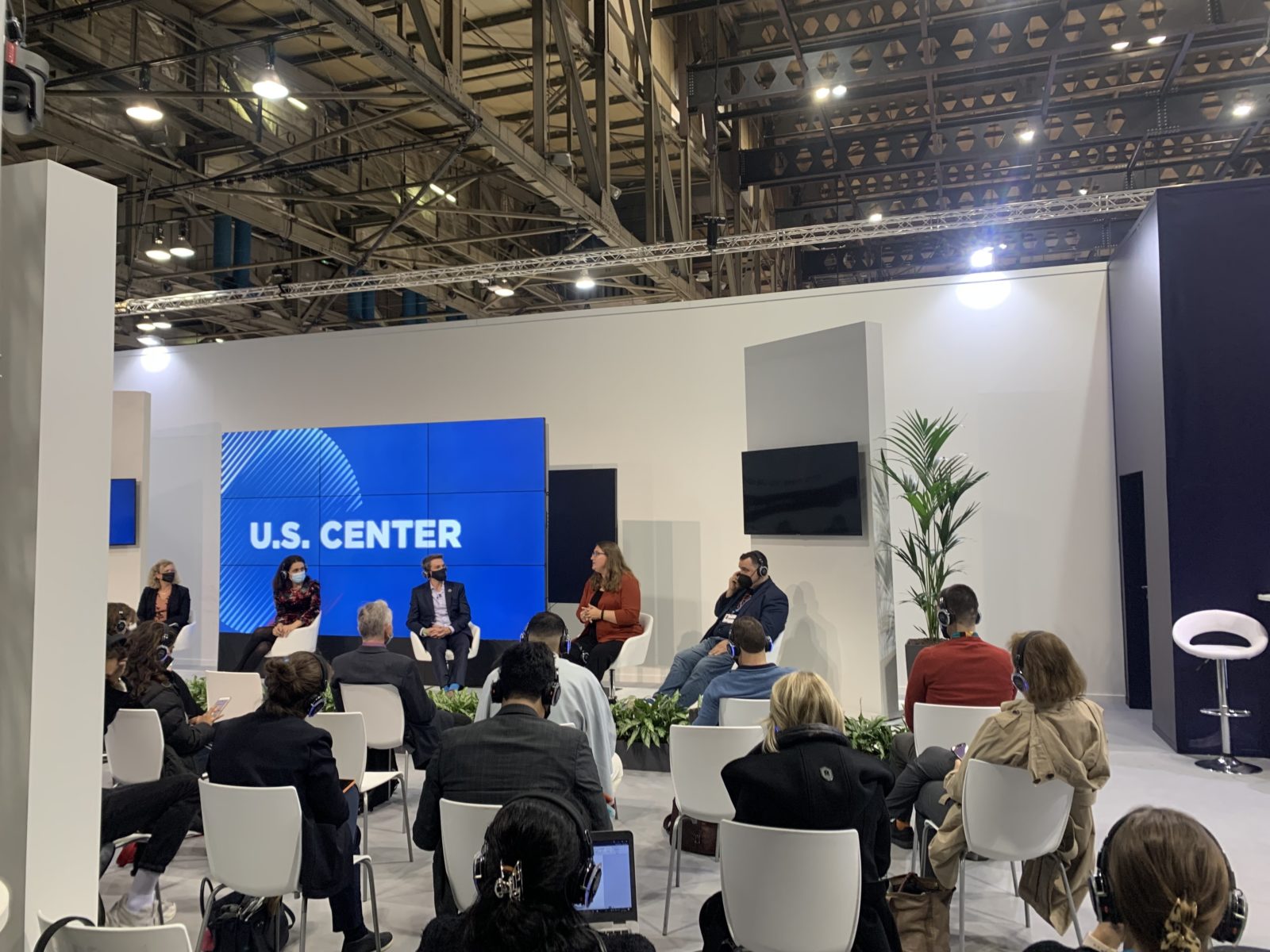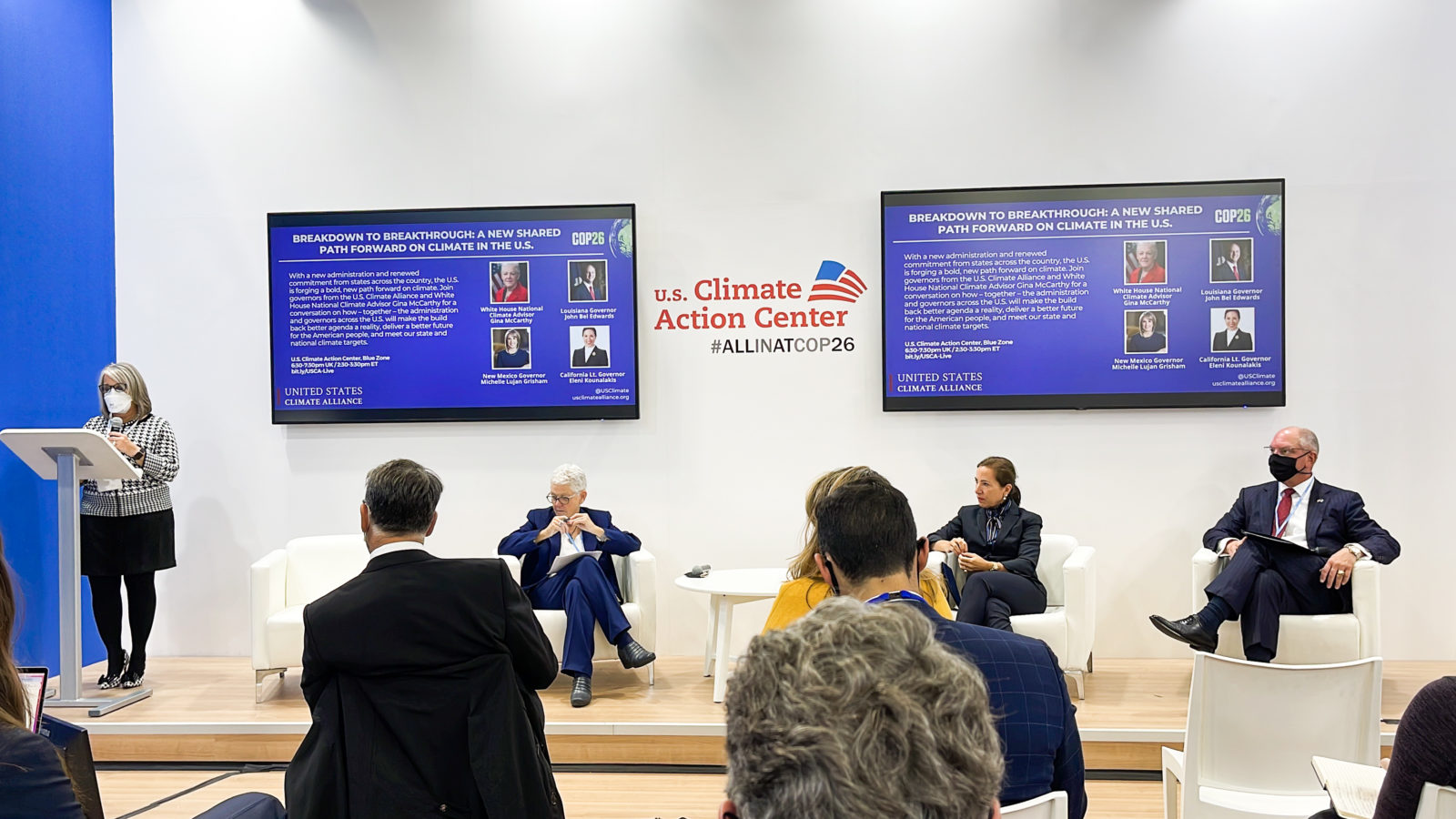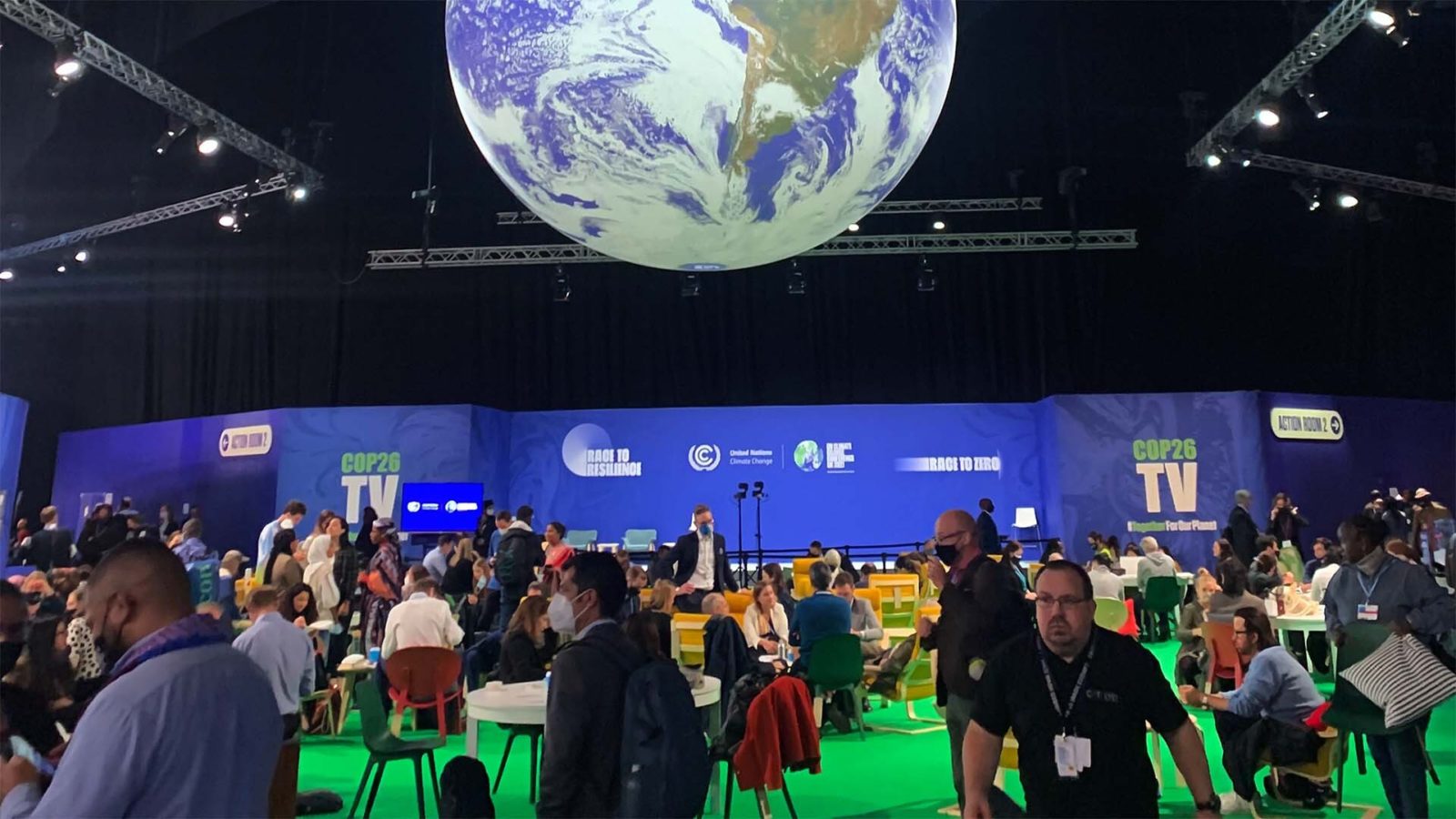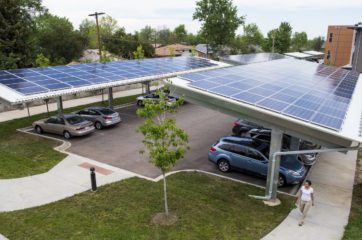Our State Climate Policy Network Director, Noa Dalzell, is at the 26th Conference of Parties (COP26) in Glasgow, following the international climate negotiations as well as robust state-level conversations centered around equitable climate policy. We’ll be sharing original, on the ground coverage from Noa as the conference progresses.
In 2019, I attended my first-ever international climate negotiations — COP25 in Madrid, Spain. One of the most notable storylines of that conference was America’s absence; former President Trump had announced the U.S. would pull out of the Paris Agreement just a few years earlier, and the U.S. pavilion was pretty much abandoned. (For context: many countries have pavilions at COP, and host events throughout the two weeks in themed rooms staffed by delegates from their nation).

Business leaders speak on a panel about tech for net-zero at the U.S. Center at COP26 in Glasgow.
In order to address America’s absence, and signal that U.S. leaders were still committed to the Paris Agreement and robust climate action, the We Are Still In coalition was born. I spent a substantial chunk of COP25 in the U.S. Climate Action Center, where subnational actors gathered to discuss the urgent need for state, local, and private sector climate action in the face of federal inaction and environmental rollbacks.
Now, the landscape has changed dramatically. The White House is no longer occupied by a climate denier, and just three days into the conference, that’s been apparent in more ways than one. Yesterday afternoon, I spotted President Joe Biden making his way out of a meeting with Indonesia President Joko Widodo, a photo-worthy sign of American involvement in negotiations. More importantly, news of American delegates pushing other countries to make ambitious commitments to reduce methane emissions and end deforestation, among other things, is a welcome change from 2019.
Given that the U.S. has its own country pavilion and federal presence at this conference, I was curious to see what role the U.S. Climate Action Center would play at COP26. On Tuesday, November 2nd, the re-branded America Is All In coalition held its opening ceremony, signifying its continued commitment to subnational climate action. America Is All In is a coalition of cities, states, tribal nations, businesses, schools, and faith, health, and cultural institutions focused on advancing a climate strategy alongside the federal government, rather than in spite of it.
The U.S. Climate Action Center is as robust as ever, with a flooded schedule of state-level events. (I’ll be live tweeting lots of these — follow along @noadalz).
The conference will run until November 14, and here are my takeaways on the subnational presence at the COP26 climate negotiations so far:
#1. The federal government is sending a clear message: state level action matters more than ever.
On Tuesday night, I attended a really interesting roundtable event with White House National Climate Advisor Gina McCarthy, New Mexico Governor Michelle Lujan Grisham, Louisiana Governor John Bel Edwards, and California Lieutenant Governor Eleni Kounalakis, which highlighted a commitment to continue prioritizing state action.

Roundtable event with Gina McCarthy, Michelle Lujan Grisham, John Bel Edwards, and Eleni Kounalakis on state-level climate action.
Gina McCarthy, the former head of the Environmental Protection Agency, opened up with a clear message: state level climate action remains absolutely critical to paving the way for strong federal action.
“Everybody probably knows that I cut my teeth at the state level and local level,” McCarthy said. “They pave the way for change to happen at the local level and at the state level. Governors give the federal government the opportunity to make [climate action] happen in a more consistent way.”
California, New Mexico, and Louisiana are three states that have led the way in their own regard, thus enabling the federal government to follow suit.
California has led on establishing clean fuel standards and clean cars in a major way, Lieutenant Governor Eleni Kounalakis said. Already, half the electric vehicles in the U.S. can be found in California. By 2035, all new cars in the state of California must be zero-emission vehicles in order to be legally sold. “California is the tail that has wagged the dog on environmental protection,” Kounalakis said. “We are continuing to play that role […] let’s call upon the other states and the federal government to follow suit.”
Louisiana Governor John Bel Edwards discussed the progress his state has made in recapturing wetlands — an important ecosystem for climate change mitigation and coastal resilience — but also touched on the many challenges that remain. Bel Edwards noted that Louisiana is one of the only states in the nation where the majority of carbon emissions don’t come from power generation. “Our pipeline density is greater than any other state in the country,” Bel Edwards said. “That infrastructure is leaking — we have 4,600 orphan wells, wells that haven’t been properly plugged. I’m embarrassed to say that.” Now, the state is demanding oil companies pay for this neglected infrastructure. McCarthy described the state’s marshlands recapture efforts as “miracles in action,” lauding Bel Edwards’ “ability to think outside the box.”
New Mexico Governor Michelle Lujan Grisham noted how her state has implemented a new process for testing natural gas well operators and curbing emissions from the oil industry. Last March, the state adopted rules to limit most venting and flaring in the oilfield as a way to reduce methane emissions, one of strongest gas capture requirements in the nation. Now, the federal government is using these rules as it looks to issue similar guidance, McCarthy said.
McCarthy was lauded by Kounalakis, Bel Edwards, and Lujan Grisham for immediately prioritizing her work with governors after getting appointed to her White House post.
“We reach out to states because Governors matter,” McCarthy said. “You test things in a way that allows us to figure out what’s best to do […] together, we can beat this thing back like we have beaten every other challenge that has faced us.”
The conversation offered great insight into how the federal government takes cues from states, and the candid remarks proved a helpful reminder that state-level action plays a critical role in this regard.
#2: Environmental Justice Must be Center Stage
The state-level policymakers and advocates at COP26 made a point of noting the importance of environmental justice in their advocacy work. This was certainly touched upon at COP25, but the prioritization of environmental justice at COP26 was heightened, indicating that actors in the climate space are increasingly recognizing that climate change disproportionately affects low-income communities and communities of color, and that solutions must take this into account.
Bel Edwards noted that natural disasters disproportionately impact these communities, and given that in the last 14 months, Louisiana has faced five major hurricanes, investments should be made accordingly.
“Low income folks are the very first displaced, and they are the last ones to recover,” Bel Edwards said. “Purposeful investments must be clearly directed toward environmental justice communities.”
McCarthy noted the importance of recognizing the unique rights and needs of tribal communities. “It’s a time to really focus on environmental justice, and it’s time to ensure that the communities that have been left behind don’t get left behind again.”
#3: State Climate Policy Network Members are all over COP 26!
On a personal note, one of the most exciting parts of my COP26 experience has been running into SCPN members and taking virtual conversations in person for the first time. Their ubiquitous presence only further demonstrates the state-level commitment to strong climate action. I’ve run into municipal leaders, state representatives, tribal leaders, business leaders, higher education leaders, and state-level advocates that I’ve only known from Zoom and email for years!
Just a few hours ago, I ran into Cornell Professor Michael Hoffman, who we’re actually in the process of spotlighting right now — stay tuned for that conversation!
On that note, if you are an SCPN member at COP26 – let’s connect! Send me an email at ndalzell@climate-xchange.org, or a message on LinkedIn. I’ll be at COP until November 11th!









